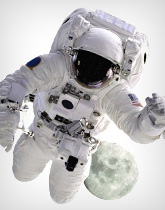At the age of nine, Ross Finman spends hours in his yard, peering through binoculars at space. Each time, he finds something new—from the moon to nebulas. Curiosity also gets him into robotics, and, a year later, he joins a youth science group. He comes up with an idea for a computer printer, made of Lego blocks, which will print thank-you notes. The group gets funding from the Kiwanis Club to make it happen.
"The newspaper named him 'Mr. Robotics,'" says his mother, Lorna Finman, recalling an article about her son published in Idaho's Post Falls Press.

When Mr. Robotics turns 14, his interest in space hasn't waned. He follows new coverage of the Mars Rover like other boys that age follow their favorite sports teams. "I would look through my telescope at Mars and imagine the Rover driving on it," he recalls. "It got me into space robotics."
He also attributes part of his interest in space to his mother, who applied for NASA's astronaut program and was in the first round of training when she became pregnant with him and had to drop out. Her son, now a senior electrical and computer engineering major at Carnegie Mellon, has worked with robotics professor William "Red" Whittaker on the Google Lunar X Prize, a $20 million competition to land a moon rover, and also with another team working to build a NASA excavating robot.
"Not many undergraduates get to work on space systems," he says. Not many students win the $10,000 Robert H. Goddard Memorial Scholarship, either. It's sponsored by the National Space Club and given to one college student annually to advance scientific knowledge through space exploration. Finman accepted the award at the 52nd annual Goddard Memorial Dinner in Washington, D.C.
—Jonathan Barnes (HS'93)



